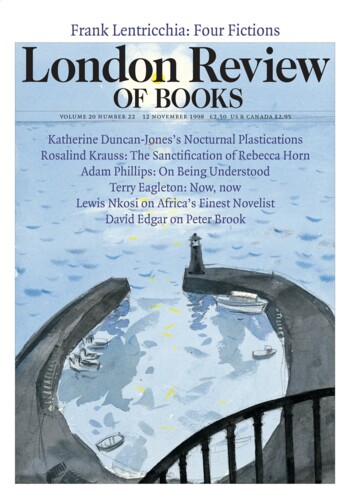Old Tunnockians
The ritual of the taxi ride to my uncle’s funeral, its names Leuchars, Pitlessie, Blairgowrie, Kippen, Balfron.
Passing a village shop whose window reads YOU CAN’T TOP TUNNOCKS, I save the striped wrapper of a Tunnock’s Caramel Wafer.
All my family are graduates of that chocolate coating, loyal to its sticky texture on the teeth.
MORE THAN 4,000,000 OF THESE BISCUITS MADE AND SOLD EVERY WEEK.
I remember a claustrophobic pub behind Christ Church, Oxford, its four sides and ceiling cased with wall-to-wall public-school ties.
My aunt’s name on the gravestone surprises me. Her name was Grace Lyon. She voted for Scottish independence.
As I confusedly take a cord at my uncle’s burial it is brilliantly sunny. I dream of a tabernacle of caramel and flame.
When I was a child my uncle drove us in his green, rusting Austin A30, once or twice to ‘the only lake in Scotland’.
We sailed over on the ferry to the central island with its ruined priory, near the other island where the Scottish kings stabled their hounds.
On the way home the silent taxi driver goes slowly. I know he is trying not to catch up with my uncle’s now empty hearse.
Alford
Blearily rummaging the Internet,
Aged thirty-eight, not knowing where I was,
I found a site designed as an old harled manse,
Sash windows opening on many Scotlands.
Through one surf broke on the West Sands, St Andrews,
And through another Glasgow mobbed George Square.
Templeton carpets fluttered up and clucked:
Crèvecoeurs, La Flèches, azeels, Minorcas,
Cochins, Langshans, Scots dumpies, Cornish game.
The hallstand’s canny, digitised gamp
Pointed to fading pixels; when I touched them
I felt The Poultry-Keeper’s Vade-Mecum,
Though in the next room, where a Bren-gun spat,
Its title changed into King’s Regulations;
Tanks manoeuvred round the hearth and range,
Smashing duck eggs, throwing up clouds of flour.
Fleeing the earth-floored kitchen, an ironing table
Hirpled like girderwork from bombed Cologne
Into the study where my Aunt Jean studied
How not to be a skivvy all her life,
While my dead uncle revved his BSA,
Wiping used, oily hands on Flanders lace.
Ministers primed themselves in Jesus’s Greek.
Bankers shot pheasants. Girls sang. My father
Walked me through presses with a map of Paris,
Though all the names he used were Cattens, Leochil,
Tibberchindy, Alford, Don, Midmill.
I understood. ‘Virtual reality?’
I asked him. In reply he looked so blank
His loved face was a fresh roll of papyrus
Waiting to be made a sacred text,
Hands empty as the screen where he projected
Slides of our holidays at Arisaig,
His body fresh cotton sheets in the best bedroom
Of his boyhood home before he was a boy.
Waiting here, he waits to meet my mother,
For a first date at St Martin in the Fields.
Here, his father, Robert, catches light
On his own deathbed, pipe and Press and Journal
Combusting in a way none can control.
Manse rooms huddle, fill with Shetland ponies,
London tubes. There is no here. Here goes.
En te oikia tou Patros mou monai pollai eisin:
In my Father’s house are many mansions:
If it were not so, I would have told you.
Send Letters To:
The Editor
London Review of Books,
28 Little Russell Street
London, WC1A 2HN
letters@lrb.co.uk
Please include name, address, and a telephone number.

